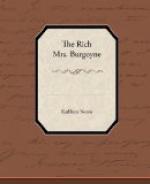“No, you couldn’t make it mission,” Mrs. Willard White decided, and several voices murmured, “No, you couldn’t do that.” “But colonial— it would be charming,” the authority went on. “Personally, I’d tear the whole thing down and rebuild,” said Mrs. White further; “but with hardwood floors throughout, tapestry papers, or the new grass papers—like Amy’s library, Will—white paint on all the woodwork, white and cream outside, some really good furniture, and the garden made over—you wouldn’t know the place.”
“But that would take months,” said Mrs. Carew ruefully.
“And cost like sixty,” added Dr. Brown, at which there was a laugh.
“Well, she won’t wait any six months, or six weeks either,” Barry predicted. “And don’t you worry about the expense, Doctor. Do you know who she is?”
They all looked at him. “Who?” said ten voices together.
“Why, her father was Frothingham—Paul Frothingham, the inventor. Her husband was Colonel John Burgoyne;—you all know the name. He was quite a big man, too—a diplomat. Their wedding was one of those big Washington affairs. A few years later Burgoyne had an accident, and he was an invalid for about six years after that—until his death, in fact. She traveled with him everywhere.”
“Sidney Frothingham!” said Mrs. Carew. “I remember Emily Holly used to have letters from her. She was presented at the English court when she was quite young, I remember, and she used to visit at the White House, too. So that’s who she is!”
“I remember the child’s visit here perfectly,” Mrs. Apostleman said, “tall, lanky girl with very charming manners. Her husband was at St. Petersburg for a while; then in London—was it? You ought to know, Clara, me dear—I’m not sure—Even after his accident they went on some sort of diplomatic mission to Madrid, or Stockholm, or somewhere, remember it perfectly.”
“Colonel Burgoyne must have had money,” said Mrs. White, tentatively.
“Some, I think,” Barry answered; “but it was her father who was rich, of course—”
“Certainly!” approved Mrs. Apostleman, fanning herself majestically. “Rich as Croesus; multi-millionaire.”
“Heavens alive!” said Mrs. Lloyd unaffectedly.
“Yes,” Willard White eyed the tip of a cigar thoughtfully, “yes, I remember he worked his own patents; had his own factories. Paul Frothingham must have left something in the neighborhood of—well, two or three millions—”
“Two or three!” echoed Mrs. Apostleman in regal scorn. “Make it eight!”
“Eight!” said Mrs. Brown faintly.
“Well, that would be about my estimate,” Barry agreed.
“He was a big man, Frothingham,” Dr. Brown said reflectively. “Well, well, ladies, here’s a chance for Santa Paloma to put her best foot forward.”
“What won’t she do to the Hall!” Mrs. Adams remarked; Mrs. Carew sighed.




